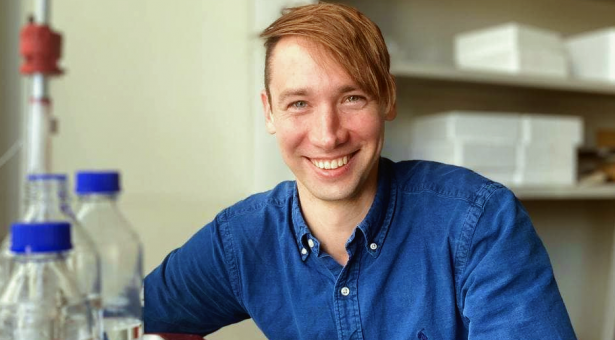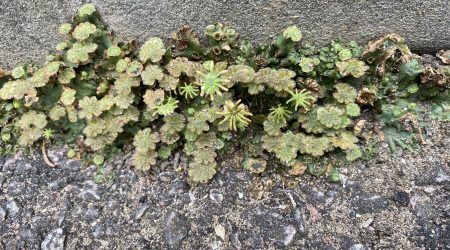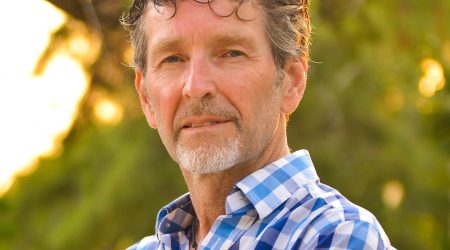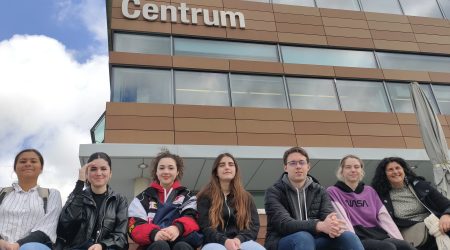Driven by curiosity; Introducing new Group Leader Dmitry Ghilarov

Dr Dmitry Ghilarov joined us in October as one of our new intake of Group Leaders.
His new group will be investigating protein molecular machines to discover, design and develop better antimicrobials.
After settling in Dmitry spoke to us about his career so far, his scientific interests and why he wanted to join the John Innes Centre to expand his research.
“I grew up in a family of scientists, so I got a lot of exposure to science and research as a child.
However, I didn’t decide that I wanted to study biology until my teenage years when I read a book about DNA, which opened my eyes to the fact that all life complexity is determined by the biological processes that we can learn to understand and manipulate.
Back then, I was reading a lot of science-fiction and dreaming about a better world filled with fantastic things we can create.
Looking back, I guess I was very naive when I started wet lab science and I quickly realised how painstakingly slow the real progress is.
However, I always felt that being a first person on Earth to know a new fact about the natural world is something so rewarding that it compensates for all the time and struggle to obtain this fact; so on a daily basis, as a scientist, I’m mostly driven by curiosity.
I have known about and been keen to join the John Innes Centre ever since I worked as Visiting Scientist in the Professor Tony Maxwell group during my first postdoc.
At the time I was working under the guidance of Konstantin Severinov in Moscow and we had a collaborative project with the Maxwell group, which allowed me to come over for almost a year. In that time I realised what a great place to do science the John Innes Centre is. There is a friendly atmosphere and access to very good infrastructure, which leads to excellent science.
However it was not very easy to get there. In 2015 I applied for a BBSRC fellowship to start my independent work which was not successful, and so in 2016 I got a fellowship in Poland instead, and moved to Krakow.
Since then, I have spent the last five years in the Malopolska Institute of Biotechnology that is a part of Krakow’s Jagiellonian University the oldest one in Poland.
My time in Poland has been very productive as I further developed my interest in structural biology, got acquainted with cryo-EM, learned some managerial skills, set some important collaborations and mature enough to earn a Sir Henry Dale fellowship enabling me to now start my lab here.
In general terms my lab will be studying biosynthesis and mode of action of bacterial antibiotics (bacteriocins) at the molecular level.
Bacteria in soil or in the human gut compete with each other for the access to resources, and this competition is regulated by bacteriocins. Therefore, we can harness them to regulate plant or human microbiomes in a precise way to restrict pathogens and promote growth of beneficial bacteria.
By determining the atomic structures of enzymes involved in bacteriocin biosynthesis and transport we can get detailed mechanistic information that we hope to use to manipulate properties of these enzymes in the beneficial way; for example, to create new compounds, beneficial compounds.
At the moment, a lot of information is missing about mode of action of many bacteriocins. We will try to rectify that by determining how exactly compounds bind to their targets, which is information absolutely necessary for drug development.
The John Innes Centre is the perfect place to do this research.
First, Cryo-EM facilities here at the John Innes Centre, will allow us to look at some targets not amenable to crystallography.
Second, and as important for me, is the scientific environment. There is a very strong cohort of people working with microbes, natural products and ribosomal peptides including; Dr Andy Truman, Professor Matt Hutchings and Professor Barrie Wilkinson. Then of course, there is my historical link with Maxwell group. There aren’t many places where I could fit in so well scientifically.
Finally, you cannot underestimate the support we receive from the administration and facilities.”



